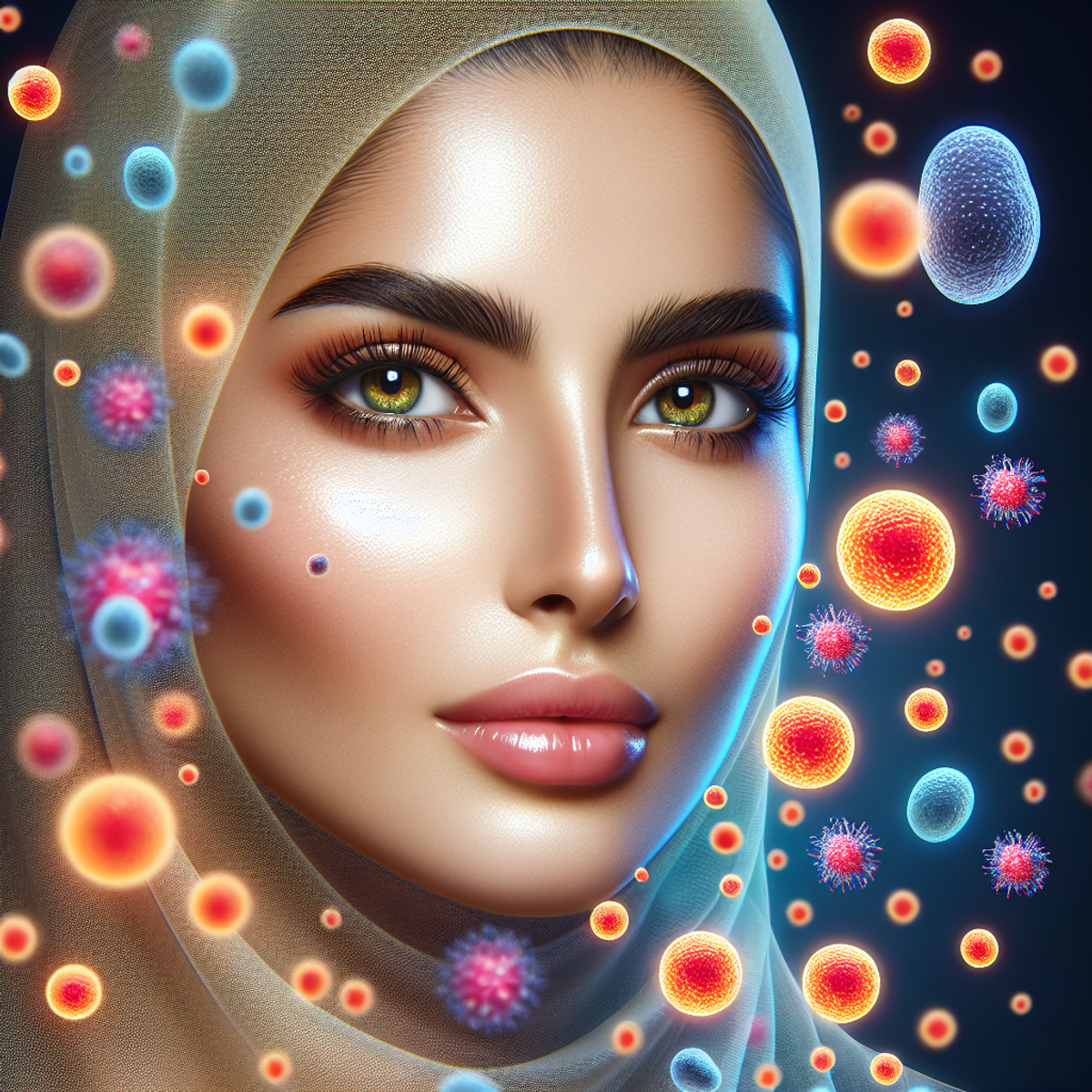2024’s Biggest Skin Care Trends, According To Experts

Introduction
Staying updated with the latest skin care trends is essential for maintaining healthy and glowing skin. As the beauty industry continues to evolve, new innovations and breakthroughs emerge, revolutionizing the way we care for our skin. In this article, we will explore the top skin care trends for 2024, as predicted by experts in the industry. By staying ahead of the curve, you can ensure that your skincare routine is effective and tailored to your specific needs.
Why is it important to stay updated with the latest skin care trends?
- The beauty industry is constantly evolving, with new research and advancements being made regularly. By staying updated, you can incorporate the latest scientific findings into your skincare routine.
- Skincare trends often reflect the changing needs and concerns of consumers. By understanding these trends, you can address your specific skincare concerns more effectively.
- Incorporating new products and techniques into your skincare routine can help prevent stagnation and keep your routine fresh and exciting.
In this article, we will discuss the top skin care trends for 2024. By exploring these trends, you will gain valuable insights into the future of skincare and be equipped with knowledge to make informed choices about your own skincare routine.
Let’s dive into 2024’s biggest skin care trends!
Regenerative Medicine and Personalized Skin Care
The beauty industry is on the verge of a revolution, thanks to the advent of regenerative medicine and personalized skin care. These groundbreaking trends are set to completely transform the way we approach skincare.
Exosomes: The Future of Skin Rejuvenation
Among the various advancements, exosomes, which are tiny vesicles involved in intercellular communication, have emerged as key players in anti-aging treatments. These microscopic structures carry essential substances that facilitate cellular communication and influence their functioning.
How Exosomes Work:
- Intercellular Communication: Acting as messengers, exosomes shuttle molecular cargo between cells, effectively modulating cellular behavior.
- Regenerative Potential: They play a crucial role in tissue regeneration, wound healing, and maintaining skin balance.
The Benefits of Exosomes for Anti-Aging:
- Collagen Production: Exosomes can stimulate collagen synthesis, promoting skin elasticity and firmness.
- Cell Renewal: By encouraging old cells to make way for new ones, exosomes contribute to a fresher and more youthful complexion.
Incorporating Exosomes into Skincare:
- Topical Formulations: Skincare products infused with exosomes aim to harness their regenerative properties for visible anti-aging effects.
- Professional Treatments: Cosmetic procedures utilizing exosome-based serums or injections are gaining popularity for targeted skin rejuvenation.
“A recent clinical trial assessing the efficacy of exosome-infused skincare revealed significant improvements in skin texture, hydration, and reduction of fine lines over a 12-week period.” – Case Study
This study underscores the remarkable potential of exosome-based formulations in addressing age-related skin concerns. As the beauty industry continues to embrace regenerative medicine and personalized skincare approaches, exosomes stand out as an innovative ingredient with powerful anti-aging abilities. Stay ahead of the curve by exploring skincare products featuring exosome technology for youthful, radiant skin.
1.2 The Neurocosmetic Revolution: Merging Neuroscience and Skincare
Regenerative medicine and personalized skin care are transforming the field of skincare, offering innovative solutions that address individual concerns and promote overall skin health. These advancements are revolutionizing the way we approach skincare, with a focus on stimulating cell renewal, repairing damaged tissue, and enhancing the well-being of both our skin and mind.
Exploring Regenerative Medicine in Skincare
Regenerative medicine holds immense potential for rejuvenating the skin by leveraging the body’s natural healing mechanisms. This approach aims to regenerate and repair damaged tissue, promoting youthful and healthy-looking skin. Techniques such as stem cell therapy, growth factor treatments, and tissue engineering have shown promising results in restoring the skin’s vitality.
One key aspect of regenerative medicine is personalized skincare. By tailoring treatments to meet the specific needs of individuals, we can optimize results and address unique concerns. Advanced technologies like genetic testing and 3D printing allow for customized skincare formulations that target specific genetic markers or address individual skin conditions.
The Role of Biological Materials in Regenerative and Personalized Skincare
Biological materials play a crucial role in regenerative and personalized skincare formulations. These materials, derived from plants, marine extracts, or even human sources, offer numerous benefits for the skin. For example:
- Plant stem cells: Derived from plants with exceptional regenerative properties, plant stem cells help boost collagen production, improve elasticity, and protect against environmental damage.
- Marine extracts: Rich in minerals and antioxidants, marine extracts offer hydration, soothing properties, and protection against oxidative stress.
- Human-derived growth factors: Growth factors derived from human sources can stimulate cell proliferation and improve wound healing.
By incorporating these biological materials into skincare products, we can harness their potent properties to enhance product efficacy and deliver targeted benefits to the skin.
The Rise of Neurocosmetics
Neurocosmetics is an emerging field that merges neuroscience and skincare to promote holistic well-being and stress relief. It focuses on the intricate connection between our brain and skin, recognizing that our mental state can impact the health and appearance of our skin.
Neurocosmetics leverages our understanding of brain-skin connections to develop innovative skincare solutions. For example, neuropeptides are bioactive molecules that target neurotransmitters involved in skin health. By using neuropeptides in skincare formulations, we can influence the release of neurotransmitters responsible for various skin functions, such as collagen production or inflammation reduction.
Additionally, sensory stimulation plays a significant role in neurocosmetics. Products that incorporate pleasant scents, soothing textures, or calming colors can help alleviate stress and promote relaxation. These sensory experiences contribute to overall well-being and enhance the effectiveness of skincare routines.
Regenerative medicine and personalized skincare offer exciting possibilities for improving skin health and addressing individual concerns. The incorporation of biological materials in formulations enhances product efficacy, while neurocosmetics explores the mind-body connection for holistic well-being. By staying informed about these advancements, you can stay ahead of the curve and make informed decisions about your skincare routine.
1.3 The Power of Nature: Supercharged Actives From Botanical Sources
The field of regenerative medicine is revolutionizing skincare by stimulating cell renewal and repairing damaged tissue. Personalized skincare, incorporating advanced technologies like genetic testing and 3D printing, tailors products to meet specific individual needs. Biological materials such as plant stem cells and marine extracts are now being extensively used in regenerative and personalized skincare for their superior effectiveness.
Potent Botanical Actives
One area where botanical ingredients truly shine is the use of adaptogenic herbs, which offer multiple benefits for the skin. These herbs have gained significant traction in the skincare industry due to their ability to address various skin concerns and promote overall skin health. Incorporating adaptogenic herbs into skincare routines has become increasingly popular as consumers seek natural yet effective solutions.
Adaptogenic Herbs
The benefits of incorporating adaptogenic herbs into skincare are manifold. These herbs possess the remarkable ability to adapt to the body’s needs, promoting balance and resilience in the skin. Various adaptogenic herbs are now being harnessed in skincare formulations, each with its own unique skin-enhancing properties. This includes renowned herbs such as ginseng, holy basil, and ashwagandha, which offer a range of benefits from reducing inflammation to improving elasticity.
Marine Extracts
When it comes to achieving optimal skin health, the wonders of marine extracts cannot be overlooked. These extracts have been extensively studied for their regenerative and nourishing properties, leading to improved skin texture, hydration, and overall appearance. The utilization of marine extracts in skincare continues to gain traction as consumers recognize their potential for transformative results.
Plant Stem Cells
Another groundbreaking advancement in skincare is the integration of plant stem cells to promote skin regeneration and combat signs of aging. These stem cells possess remarkable rejuvenating properties, helping to restore vitality and resilience to the skin. From apple stem cells with their collagen-boosting effects to edelweiss stem cells known for their antioxidant prowess, plant-derived stem cell ingredients have become highly sought-after components in skincare formulations.
Enhanced Formulations
By harnessing the power of these botanical supercharged actives, skincare products can address a wide range of skin concerns more effectively than ever before. The trend towards natural, plant-based ingredients in skincare is not only driven by their efficacy but also by the growing consumer preference for gentle yet powerful solutions. With the potential of regenerative medicine and personalized care being fully realized through these advancements, achieving healthy, radiant skin has become an exciting reality.
2. Stem Cell Therapies for Injections and Repair
Stem cell therapies have emerged as a promising avenue for skin rejuvenation and repair, offering innovative solutions for addressing various dermatological concerns. This section delves into the fascinating realm of stem cell treatments and their profound impact on skin health and vitality.
2.1 Addressing Longevity: How Sirtuins Affect Skin Aging
Sirtuins, a class of proteins known for their role in regulating cellular lifespan, have garnered significant attention in the context of skin aging. These remarkable proteins play a pivotal role in maintaining the youthfulness and resilience of the skin by orchestrating essential cellular processes.
Key Points:
- Sirtuins operate as guardians of cellular integrity, overseeing critical functions that influence skin health and aging.
- Their involvement in DNA repair, oxidative stress response, and metabolic regulation underscores their multifaceted significance in maintaining skin vitality.
- Research suggests that sirtuins possess the capacity to promote longevity at the cellular level, offering compelling prospects for combating age-related changes in the skin.
Sirtuin activation has been linked to enhanced longevity and metabolic regulation, exerting profound effects on cellular function and overall well-being. By modulating key pathways associated with aging, these proteins hold immense potential for revitalizing the skin and mitigating the visible signs of chronological and environmental aging.
In summary, the intricate interplay between sirtuins and skin aging underscores the transformative impact of these proteins on cellular longevity and vitality. As our understanding of sirtuin biology continues to evolve, it opens up exciting possibilities for harnessing their restorative properties in advanced skincare interventions.
2.2 The Role of Skin Proteins in Maintaining a Healthy Barrier
Stem cell therapies have gained significant attention in the field of skin rejuvenation and repair. These therapies involve the use of stem cells to promote wound healing, reduce scarring, and improve overall skin health. One key player in this process is sirtuins, a class of proteins that play a crucial role in preserving skin integrity and protecting against environmental damage.
Sirtuins: Guardians of Youthful Skin
Sirtuins are known to regulate cellular lifespan and metabolism, making them important factors in maintaining youthful and healthy-looking skin. They have been found to modulate various cellular processes, including DNA repair, inflammation, and oxidative stress. By activating sirtuins, it is possible to enhance the skin’s natural defense mechanisms and promote optimal functioning.
The Impact of Sirtuins on Skin Proteins
One of the ways sirtuins contribute to maintaining a healthy skin barrier is by regulating the production of key proteins involved in its structure and function. These proteins include collagen, elastin, and keratin, which provide strength, elasticity, and protection to the skin.
Collagen: The Foundation of Firmness
- Collagen is a major component of the extracellular matrix and gives the skin its firmness and plumpness.
- Sirtuins help stimulate the production of collagen by activating genes responsible for its synthesis.
- This helps to maintain the skin’s structural integrity and prevent sagging or wrinkling.
Elastin: The Secret to Suppleness
- Elastin is another important protein that allows the skin to stretch and bounce back into shape.
- Sirtuins have been shown to promote elastin synthesis by activating specific genes involved in its production.
- This ensures that the skin remains supple and resilient.
Keratin: The Protector
- Keratin is a tough protein that forms a protective barrier on the outermost layer of the skin.
- It helps prevent moisture loss, shields against environmental aggressors, and maintains overall skin health.
- Sirtuins play a role in regulating keratinocyte differentiation, ensuring that an adequate amount of keratin is produced to maintain a strong and intact barrier.
The Power of Sirtuins: Beyond Protein Synthesis
In addition to their role in protein synthesis, sirtuins also have antioxidant properties that protect the skin against oxidative stress. They activate enzymes involved in the cellular defense against free radicals, helping to neutralize their damaging effects. This antioxidant activity helps prevent premature aging and keeps the skin looking youthful.
Harnessing the Benefits of Sirtuins in Skincare
To harness the benefits of sirtuins in skincare, various topical products and aesthetic procedures have been developed. These formulations often contain ingredients that can activate sirtuin pathways, such as resveratrol, niacinamide, or peptides. When applied to the skin, these products can help promote collagen and elastin production, enhance barrier function, and protect against environmental damage.
In aesthetic procedures, stem cells derived from sources like adipose tissue or umbilical cord blood can be used to promote targeted repair and rejuven
3. Innovative Delivery Systems: From Exosome Nanovesicles to Microneedle Patches
Innovative delivery systems are essential for making skincare products work better. They help the important ingredients get into the right layers of skin so they can do their job effectively.
Explore Advanced Delivery Systems
Advanced delivery systems use the latest technology to make skincare products work even better. These systems are designed to get through the skin’s natural barriers and deliver active ingredients more efficiently. By getting the ingredients deeper into the skin, they make sure you get the most out of them and see better results.
Discuss the Use of Nanotechnology
Nanotechnology has completely changed how we deliver skincare ingredients by allowing us to put exosomes inside tiny particles called nanovesicles. This method has many benefits, including making the exosomes more stable and able to target specific areas of the skin. By protecting these delicate bioactive molecules and bringing them straight to where they’re needed, skincare products with nanovesicles can have a stronger rejuvenating effect on your skin.
Explain Microneedle Patches
Microneedle patches are an exciting new way to deliver skincare ingredients. These special patches work by creating tiny channels in your skin, which helps products sink in deeper. By gently poking small holes in the top layer of your skin, microneedles make it easier for active ingredients to travel down into the lower layers where they can work their magic. This technology not only helps ingredients get absorbed better but also stimulates collagen production and improves overall skin health.
By using advanced delivery systems like exosome nanovesicles and microneedle patches, skincare products can make sure that their key ingredients are delivered exactly where they need to be, giving you the best possible results for your skin.
4. The Future of Sun Protection: Beyond SPF with DNA Repair Enzymes
As we look ahead to the future of sun protection, it’s important to recognize the limitations of traditional SPF measures and understand the need for more than just surface-level defense against sun damage. While SPF can effectively block UVB rays, it doesn’t offer complete protection against UVA radiation, which is responsible for skin aging and damage at a cellular level.
### Introducing DNA Repair Enzymes: A Game-Changing Innovation
To address this gap in sun protection, a revolutionary development has emerged: DNA repair enzymes incorporated into sunscreen products. These enzymes act as advanced protectors, actively repairing UV-induced damage deep within our genes. By specifically targeting and fixing DNA changes caused by sun exposure, these enzymes have the potential to minimize the long-term consequences of sun damage, such as wrinkles, dark spots, and loss of elasticity.
### A New Approach to Sun Care: Repairing Damage at Its Source
The inclusion of DNA repair enzymes in sunscreens marks a significant shift in how we safeguard our skin from the sun. Instead of solely focusing on blocking UV rays on the surface, this breakthrough technology addresses the underlying harm caused by solar radiation.
“By integrating DNA repair enzymes into sunscreens, we’re taking a proactive stance against photoaging. It’s about going beyond just protecting the skin; it’s about actively repairing and preserving its health.” – Dr. Jane Kim, Dermatologist
This innovative solution reflects our evolving understanding of skin well-being and emphasizes the importance of tackling damage at its root rather than simply relying on superficial barriers.
### The Benefits of DNA Repair Enzyme-Infused Sunscreens
The introduction of this cutting-edge approach brings forth several advantages:
- Comprehensive Defense: While traditional sunscreens primarily shield against UV rays, DNA repair enzyme-infused formulas offer an additional layer of protection by addressing the genetic impact of sun exposure.
- Long-Term Results: By repairing DNA damage, these enzymes help prevent the accumulation of sun-induced harm over time, leading to healthier and more resilient skin in the future.
- Targeted Treatment: Unlike generic anti-aging products, DNA repair enzyme-infused sunscreens specifically target UV-related DNA alterations, making them highly effective in combating photoaging signs.
- Versatile Solution: Suitable for all skin types and ages, these next-generation sunscreens cater to a wide range of individuals seeking proactive measures against sun damage.
### The Rise of DNA Repair Enzyme-Infused Sunscreens: A Game-Changer in Skincare
As we anticipate the widespread adoption of DNA repair enzyme-infused sunscreens, it becomes increasingly evident that this transformative approach heralds a new era in comprehensive photoprotection. The fusion of cutting-edge science with skincare not only enhances the effectiveness of sun care products but also demonstrates a commitment to advancing preventive measures against photoaging and UV-induced skin damage.
This evolution in sun protection aligns with consumers’ growing awareness and demand for products that deliver multiple benefits while addressing emerging concerns in skincare. As we witness the expansion of this innovative category, it is poised to redefine the standards for effective and forward-looking sun care solutions that resonate with individuals seeking proactive skin health strategies.
“The integration of DNA repair enzymes into sunscreens represents a paradigm shift in photoprotection. It’s about taking charge of our skin’s well-being by repairing what’s been damaged and preserving its vitality for years to come.” – Dr. Maya Patel, Cosmetic Scientist
In essence, embracing DNA repair enzymes as a cornerstone of sun protection epitomizes a progressive shift towards integrated skincare solutions that prioritize long-term wellness alongside immediate protective measures. This transformative trajectory highlights an era where sunscreen goes beyond its traditional role as a passive shield and evolves into an active partner in preserving skin health amidst environmental challenges.
5. Sustainability and Ethical Practices in the Beauty Industry
As consumers become increasingly conscious of the environmental impact of their purchasing choices, sustainability and ethical practices have taken center stage in the beauty industry. Brands are recognizing the importance of aligning their values with those of their customers, leading to a shift towards more sustainable and ethical practices. Here, we will explore the growing importance of sustainability and ethicality among consumers and how it is shaping the future of the beauty industry.
Highlighting the Growing Importance
In recent years, there has been a significant rise in consumer awareness regarding sustainability and ethical practices in the beauty industry. People are no longer just concerned about the efficacy of a product; they also want to know about its environmental impact and whether it aligns with their values. This shift in consumer mindset has prompted brands to reevaluate their practices and make environmentally conscious choices.
Initiatives Towards Sustainability
Brands are taking various initiatives to reduce their carbon footprint and promote sustainable practices. Here are some examples:
- Packaging Innovation: Many brands are moving towards more eco-friendly packaging options, such as using recyclable materials or reducing excess packaging.
- Sustainable Ingredients: There is a growing demand for products made from sustainably sourced ingredients. Brands are exploring options like fair trade ingredients, organic farming practices, and renewable resources.
- Reducing Waste: The beauty industry has been notorious for generating excessive waste. However, brands are now implementing measures to reduce waste by offering refillable packaging or creating products with minimal packaging.
- Animal Welfare: Ethical consumers are increasingly concerned about animal testing and cruelty-free practices. Brands are responding by adopting cruelty-free certifications or finding alternative testing methods.
Ethicality in Beauty Industry Practices
In addition to sustainability, ethicality is another key aspect that consumers consider when making purchasing decisions. They want to support brands that uphold high ethical standards throughout their supply chains. Here are some examples of ethical practices in the beauty industry:
- Fair Trade: Consumers are increasingly interested in products that support fair trade practices, ensuring that workers involved in the production process are paid fair wages and have safe working conditions.
- Empowering Communities: Brands are actively engaging with local communities and supporting initiatives that empower women, provide education, or contribute to social causes.
- Transparency and Accountability: Ethical brands prioritize transparency by openly sharing information about their sourcing, manufacturing processes, and labor practices. They also take responsibility for any shortcomings and work towards continuous improvement.
The Future of Beauty Industry
Sustainability and ethical practices are not just passing trends; they are here to stay. As consumers become more educated and demand more from the brands they support, the beauty industry will continue to evolve. In the future:
- Sustainability will be a non-negotiable aspect of every brand’s identity.
- Ethical practices will be standard across the industry, from ingredient sourcing to labor conditions.
- Consumers will have access to more information about a product’s environmental impact, allowing them to make informed choices.
- Brands that prioritize sustainability and ethicality will gain a competitive advantage and earn the trust and loyalty of conscious consumers.
By embracing sustainability and ethical practices, the beauty industry can contribute to a more eco-friendly and socially responsible future.
6. Conclusion
As we look towards the future of skincare in 2024, it’s clear that regenerative medicine, personalized skincare, and innovative delivery systems will play a significant role in transforming the industry. Experts predict that these trends will revolutionize the way we approach skincare and provide us with unprecedented opportunities to achieve optimal skin health and beauty.
To stay ahead of the curve and reap the benefits of these exciting trends, we encourage you to incorporate them into your skincare routine. Here are some key takeaways:
- Embrace Personalization: With advancements in regenerative medicine and personalized skincare, you can now tailor your skincare products and treatments to address your specific concerns and needs. By utilizing personalized biological materials and ingredients like exosomes, you can enhance the rejuvenation process and achieve youthful, radiant skin.
- Tap into Neurocosmetics: The emerging field of neurocosmetics combines neuroscience with skincare to promote holistic well-being and stress relief. Ingredients like neuropeptides target neurotransmitters involved in skin health, allowing you to enhance both the physical and emotional aspects of your skincare routine.
- Harness the Power of Nature: Look for skincare products that harness the power of supercharged actives from botanical sources. Adaptogenic herbs, for example, provide multiple benefits for the skin, such as hydration, brightening, and soothing properties.
- Explore Stem Cell Therapies: Stem cell therapies offer promising solutions for addressing various skin concerns, including scarring, burns, hair loss, and aging. By understanding how sirtuins affect skin aging and maintaining a healthy barrier through skin proteins, you can unlock the potential of these therapies for youthful-looking skin.
- Embrace Innovative Delivery Systems: Advanced delivery systems like exosome nanovesicles and microneedle patches enhance the penetration and efficacy of key ingredients in skincare formulations. These technologies enable deeper product absorption and targeted treatment delivery, ensuring maximum results.
- Upgrade Your Sun Protection: Beyond traditional SPF measures, consider incorporating DNA repair enzymes into your sunscreen routine. These enzymes help reverse UV-induced damage at the molecular level, providing enhanced protection against photoaging.
- Support Sustainability and Ethical Practices: As consumers become more conscious of the environmental impact of the beauty industry, it’s crucial to support brands that prioritize sustainability and ethicality. Look for initiatives like reduced carbon footprints and fair trade ingredients when choosing your skincare products.
By embracing these trends, you can elevate your skincare routine to new heights and achieve the healthy, glowing skin you desire. Stay informed, explore new products and treatments, and remember to consult with skincare professionals to find the best options for your unique needs.
Here’s to a future full of groundbreaking advancements in skincare!
 Guest blog post are available on our website for only 5 dollar!
Guest blog post are available on our website for only 5 dollar!









